- Home
- Lin Carter
The Valley Where Time Stood Still Page 2
The Valley Where Time Stood Still Read online
Page 2
“What is it that you do, ’Gort?”
“I search for ‘power-metal,’ Thaklar,” answered M’Cord, meaning uranium. The warrior nodded thoughtfully: the F’yagha, he knew, had a strange lust for the crumbly gray ore, which he knew to be worthless. It was but one of the many mysteries about the Outworlders that baffled him.
He grunted. “And if you find metal, ’Gort?”
“If I find much metal, then I am a rich man, Thaklar,” M’Cord said, truthfully enough.
The Martian laughed—a peculiar, snarling sound with contempt in it, and little humor. “Then you will fly to your home world in a sky machine, ’Gort!” he observed. “I hope that you find much metal. I would that all of the F’yagha in the world could find much metal; then they would all fly home in sky machines and leave us in peace.”
“That would not happen, Thaklar,” M’Cord said, grinning. “If very much power-metal were found, very many more of my people would come here, because every man wishes to become wealthy.”
“Aeiii! Then I give thanks to the Timeless Ones that the world is poor in power-metal, and would that it were even poorer!” Thaklar moaned. It was as close to making a joke as he had yet come, and M’Cord smiled at him.
The warrior, however, did not return the smile. M’Cord had saved his life, and he knew it. But he was still a F’yagh—still a Hated One. Down deep inside, somewhere, Thaklar may have felt gratitude toward the Earthling; but not necessarily. The Martians were barbarians, having lost the high civilization they once had in the
Upper Cretaceous. Like all barbarians, they were savage, cruel, and thoroughly unpredictable.
Or so M’Cord believed, anyway. And he still turned his back on Thaklar with a certain degree of trepidation. The warrior was perfectly capable of shooting him in the back, if only to take his mount and his gear. They were not yet friends; but they were not exactly foes, either. A sort of armed truce stretched between them, and probably a temporary one at that.
“If you’re strong enough to make jokes, you’re strong enough to get breakfast started,” M’Cord said, pointing toward the saddlebags. Thaklar gave him a yellowy glare but did not smile. After a while he got up, hobbling stifflegged, and began to search through the bag.
They ate self-heated cans of scrambled eggs and bacon bits, and drank black coffee that had a metallic aftertaste, which was a lingering flavor from the processed water from the moss leaves. Fresh coffee was a mad luxury on Mars, but M’Cord insisted on it.
Then they rode on, with M’Cord still afoot, again leading the loper.
“Where is it that you go, ’Gort, in seeking the power-metal?” Thaklar asked about an hour later.
M’Cord shrugged. “Up toward Eos, and along the Erythraeum,” he said, but he used the native terms rather than the Earthsider geographical names.
Thaklar meditated on that. After a while M’Cord dared to ask where he had been heading when his beast died. It was a bit risky, that question. It was strictly against Custom to inquire into the personal business of a newly met acquaintance. He was not particularly surprised that Thaklar pointedly kept silent. The silence continued for half an hour more. Then, unexpectedly, the warrior spoke up.
“I go south and east,” he said flatly.
“Then we are going in opposite directions,” M’Cord remarked.
Thaklar said nothing.
M’Cord plodded along, not caring for conversation anyway. His thighs ached and the muscles in the backs of his legs were on fire from the unusual exercise of trudging through ankle-deep powdery sand.
“There is no power-metal in the high country,” said Thaklar, unexpectedly breaking silence again.
“Maybe not; but that’s where I’m going,” M’Cord grunted, too tired to bother being diplomatic.
Another interval of silence; this time it lasted for about twenty minutes.
“If you were going south and east, I could show you power-metal,” Thaklar said.
M’Cord stopped and bent over to massage his weary calves. While he did so, he thought about it. Thaklar still wore his energy weapon; he was perfectly capable of drawing it, forcing M’Cord to disarm, and making him head southeast at gunpoint. Or, M’Cord grimly reminded himself, of shooting him down where he stood, and going on alone. This sort of slow-motion effort at persuasion was, quite obviously, a gesture of something like friendship.
South and east. That sounded like Deucalionis Regio, or the Sabaeus Sinus Plateau. What in the world did Thaklar hope to find in that part of the country? The plateau was a dead wilderness of sterile rock, cleft asunder by a thousand canyons and ravines; Deucalionis was a curved tongue of dustland that extended into the highlands between two plateaux. Seventy million years ago it had been a bay, perhaps, or a river delta, cut deep into a continental coast. Now it was nothing: dead rock, scoured with sand, where few wild beasts roamed.
The trouble was, M’Cord wasn’t going there. He had his heart set on the coastal canyons of the big Mare to the west.
And he was damn well going where he wanted to!
Instead of saying no, he temporized by chancing another question.
“Are you bound for a camp of your people?”
This time, for some reason, the answer came swiftly.
“My people are my business, F’yagh.”
“Didn’t mean to pry. Sorry.”
“I … have no people. I am aoudh,” Thaklar said heavily, using an untranslatable term whose meaning lay somewhere between “outlaw” and “orphan,” or at least, “one who has no kin.”
“ ‘The gods are father to every man,’ ” M’Cord quoted.
Again, the interval of silence.
Then grudgingly: “An Outworlder that knows The Book? You are certain, ’Gort, you are no god-peddler?”
M’Cord was too weary to smile. “I’ve been here for ten years. I learned the Tongue. Often I live and work among your people—”
Stung, Thaklar stiffened in the saddle. “Not among my people!”
M’Cord made an offhand gesture. “The Low Clans, I mean.”
“I am a warrior of the High Blood, Outworlder!”
“I know you are. Must we quarrel? I am weary.”
Thaklar bent a fierce yellow gaze on him as he stumbled along painfully, slump-shouldered. When he spoke, it was in a softer tone.
“I ride in comfort, while you tread the dust like a slave. Why is this?”
M’Cord felt like hitting him. “I walk because I must, damn you! You ride because you have a broken leg.”
Pride flamed in the hawk face of the Martian.
He jerked back on the reins, bringing the scarlet beast to a sudden halt. Painfully, he swung one leg up over the saddlebow.
“I can walk. You will ride.”
“Get back up there, you damned fool!” M’Cord swore, starting forward. Suddenly he was looking down the muzzle of an energy gun. He stopped short, glaring first at the gun, then at Thaklar’s obstinate face.
“I am a Dragon Hawk warrior; no F’yagh from the Wetlands does me favor! Get into the saddle, ’Gort; I will lead the beast”
“You can’t walk five steps, and you know it. So stop acting like a woman,” M’Cord growled.
The Martian hissed and spat. His furcap ruffled like hackles.
“You… call me… woman?”
M’Cord matched him glare for glare.
“I call you a damn fool. Get back up in that saddle! I do you no favor, Thaklar. I walk because I know that you cannot. Are these not the dustlands? Is it not Custom for one man to help another here?”
The pistol did not waver. M’Cord looked down the cold black eye of the muzzle, breathing heavily.
“Go on, shoot me down, then. Is it thus the Dragon Hawk warriors treat men who have done them no hurt? Shoot me down—and take all the water!”
It was cleverly said. To accuse a man of acting from water-motive was to strike at the roots of his honor. It was not so much an insult as a crushing stroke of ultimate contemp
t.
Silence stretched tight, almost to the snapping point. Sweat trickled down M’Cord’s ribs under his thermalsuit. The back of his mouth was dry, but he held his face rigid and impassive as iron, fearing to swallow and seem afraid.
Something almost like admiration gleamed briefly and was gone in the fierce yellow eyes of the other. He holstered the gun and attempted to remount the saddle, but could not, because of the leg, so M’Cord gave him a hoist.
Neither man had anything to say, but now the silence between them was somehow comfortable and without strain.
An hour past noon, they rested.
M’Cord was heading for Oxia Palus. There, at the junction of five minor canals, was a commo station. It was untended, of course, only an emergency radio beacon, but M’Cord knew he could put a call through to Mareotis, where the People kept a sort of embassy and where the Colonial Administration maintained a combination trading post and first aid station. A medic in a skimmer could be there in two days, three at the most, with one of the native Hndolanthi. A Hndolanth is a kind of interpreter-cum-herald. He said as much to Thaklar.
Again, the customary interval of grim silence between morsels of conversation. M’Cord was getting heartily sick of it.
Then Thaklar opened the breast of the fur-lined leather shirt he wore. When he laid his breast bare M’Cord saw the Dragon Hawk emblem tattooed about his heart.
From an inner pocket Thaklar withdrew a small round object.
“If you will take me south and east, into Chumndar Draw, I will give you—this.”
He held out his hand and opened it. He was holding a ziriol the size of a small walnut
M’Cord said nothing, but his eyes widened.
A ziriol is a purple ruby, a kind found only on Mars. Prized among Earthside jewelers, the gems are immensely, even fabulously, rare. A ruby that size—and it looked to be of the finest water—was worth something in the neighborhood of five hundred thousand dollars.
Even in CA scrip, that’s a lot of dollars.
In ten years of bumming around the dustlands—a little smuggling here, a bit of gun-running there, and quite a lot of prospecting everywhere—M’Cord had yet to gamer a tenth of the sum.
He reached out, picked it up, examined it closely. No counterfeit; the gem was true. And superb. A taint of vanadium salts in the ruby matrix produced the rare, imperial purple shade.
The gem he held cupped in his palm could set him up for life. Oh, maybe not with a villa on the Riviera and a bungalow on the fashionable South Slope of Everest and a hunting cabin in the Antarctica Game Preserve, but he could live comfortably enough for all his years on what that gem would bring in the side streets of Amsterdam.
He tossed the shimmering crystal back to Thaklar, who snatched it deftly from the air. Then he dug out his battered compass, took a squint at the sun, and gestured off to one side.
“Chumndar Draw is over that way, I think. We’d better get started.”
III. Fear Has Yellow Eyes
It was hard going, but they took it easy, frequently stopping to rest. Since M’Cord had to slog along on foot, these rest stops were imperative. He was a big man, and strong, and as tough as they come, but wading through ankle-deep powdery sand was as hard as wading through viscous mud, and one tires easily on Mars. That’s because of the air, which is thin and cold and so dry that it makes a wintry day on the Andean Plateau seem like the humid depths of the Matto Grosso.
The gravity was no problem—at an apparent fraction of his Earthside weight, M’Cord was as spry and nimble as a boy. No, it was the air—cold enough to sear your throat lining and dry enough to bum your lungs, and starved for oxygen. Long ago it had been commonly accepted that a man could not live without artificial aids on the surface of the dusty old planet. But when the first expeditions got there they discovered that the air was considerably richer in oxygen than spectroscopic analysis had ever shown. Still too thin to breathe for very long, of course—a man without a respirator and thermalsuit would be dead in a few hours, and not pleasantly, either. The first colonists had lived in cramped towns huddled under collapsible plastic domes, wearing respirators on those rare occasions when they ventured out of their cocoons. But in time the scientists had found an easier way of doing things, as is usually the case with scientists. But it was not until they perfected the Mishubi-Yakamoto treatments that Earthsiders could move about on Mars without cumbersome tanks or masks. The treatments were lengthy and painful, and, more to the point, they were expensive; but a lone prospector like M’Cord could not exist on Mars without them. It had taken him a couple of years to pay off the medical fees, but it had been worth it.
In deft and subtle ways, the treatments altered human body chemistry so that the body’s need for oxygen was considerably lessened and its capacity for using every molecule of the stuff was increased. Subsidiary treatments toughened throat linings and the cellular structure of the lungs so that they took no damage from the dryness and cold. But a man wearied more easily on Mars, despite the reduced weight, and became more susceptible to lung diseases. Even in this, nature found ways to compensate, to balance one loss with another gain: your lungs might go bad on Mars, but your heart was strong as iron.
Right now M’Cord would have happily exchanged his iron heart for a pair of iron legs. He had encountered Thaklar on the Martian equator, at the northernmost tip of the Aram Desert. Following the new direction they had agreed on meant that he had to trek due east about two degrees longitude around the tip of a long, narrow promontory called (for some reason he never knew) the Margaritifer Sinus. Then they turned due south, crossed the central expanse of the Aram, with the interminable rocky wall of the Sinus marching at their right, and still further south and east into the Regio. They got deeper and deeper into the Regio, until, to the north, the ridgeline of the Sabaeus Plateau blocked the entire horizon.
M’Cord began to feel like he was going to trudge along forever. For the millionth time he cursed his lack of foresight in not bringing along a pack slidar as well as a saddle-beast. Every night, rubbing aching legs, he discovered the existence of muscles he had not known he possessed.
The further they descended into the Regio, the more he puzzled over Thaklar’s reasons for wishing to enter this desolate and uninhabited dustland. What conceivable motive would a presumably sane man have for venturing into this powdery hell where even a sandcat couldn’t find much food to live on? The native kept his mouth shut about his reasons; he held his secrets to himself, and, despite the grudging comradeship which gradually grew between the two, he shared no confidences with M’Cord.
This new camaraderie came into being in slow and gradual ways. It was not friendship; it was not even the mutual sharing of hardships between two equals. And it was not ever brought out into the open, for the two seldom exchanged words, and when they did it was only to discuss the raw necessities of life.
M’Cord was, by nature, a dour and taciturn man, a man of few words. He kept to himself, had few friends, and never talked about the past. As for the Martian, his hatred of the accursed Earth colonists who had stolen half his world over the last five decades went so deep and strong as to have become almost an instinctive thing by now. Probably he trusted M’Cord by this time as much as he could ever trust a member of his accursed Out-worlder race; perhaps he even liked the big man in his grim, somber way. If this thing which grew between them was too tenuous to be called friendship, at least it could be called mutual respect. The sort of thing a strong man feels for another man of equal strength, despite what differences of race or religion or nation stand between them. The sort of thing Kipling was thinking of when he wrote those old lines some two centuries before:
Oh, East is East, and West is West, and never the twain
shall meet,
Till Earth and Sky stand presently at God’s great
Judgment Seat.
But there is neither East nor West, Border,
nor Breed, nor Birth,
When two strong
men stand face to face, though they
come from the ends of the earth!
Part of what grew up between them was that, of course: a man who struggles, endures, and suffers without complaint comes to recognize similar qualities in another man, and is usually smart enough to know the rareness of the quality and the value of it. And there was another thing that bound them together, although neither of them realized it yet; and that was that, under the skin, behind the racial and planetary differences, they were very much the same men.
Both had loved deeply, trusted too much, and both had been betrayed by what they loved. Both had been hurt, terribly hurt, by a woman once. Their hearts wore the same crust of scar tissue from much the same kind of wound. Neither knew it nor even suspected it of the other, but something within them sensed the kinship hi the other. And the strange sort of quasi friendship that knit them together existed without words or smiles or confidences, existed in dour silence and brooding, wordless companionship.
In time, the broken bones knit, and knit cleanly. Thak-lar could use the leg, but he limped upon it, and it often gave out beneath him. When this happened—as it did rather often, because he forced himself to use the limb— he would lie there cursing in his spitting, sibilant language at the offending leg, while M’Cord sat grinning, waiting for Mm to get up. Thaklar never knew that M’Cord had been slipping medicine into Ms rations from the first, chemicals that would fight infection, drive down Ms fever, and special glandular stimulants designed to greatly accelerate the mending of bones.
This last pharmaceutical had been developed from a Martian cave fungus, and it was crucial to Earthsiders like M’Cord. A broken leg or arm was very nearly the worst thing that could happen to an Earthsider on Ms own in the wastes, far from the nearest Colonial Administration clinic. It was almost as serious as a broken pressure-still, and M’Cord never ventured very deeply into the dustlands without a plentiful supply of the pharmaceutical. He knew, or guessed, that the stiff-necked warrior would fiercely reject the notion of partaking of any of the ungodly F’yagha medicines, had he been apprised of the fact; so M’Cord had simply mixed the stuff into Thaklar’s meals from the beginning. The proud native had suspected nothing when M’Cord began making it Ms habit to prepare their rations; to Thaklar, food making was woman’s work, anyway, and he would have resented having to share the task.

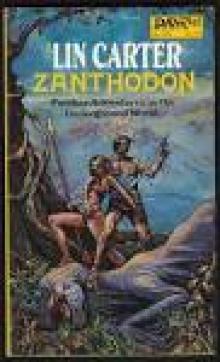 Zanthodon
Zanthodon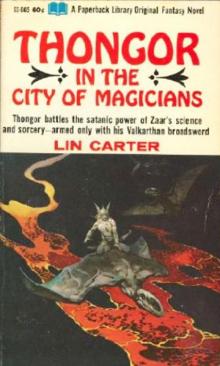 Thongor in the City of Magicians
Thongor in the City of Magicians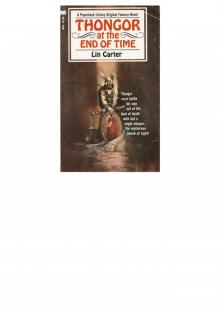 Thongor at the End of Time
Thongor at the End of Time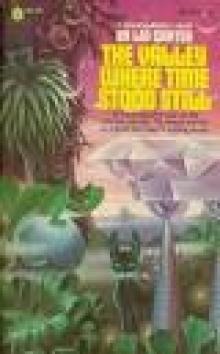 The Valley Where Time Stood Still
The Valley Where Time Stood Still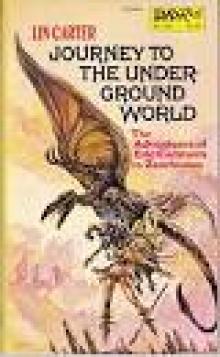 Journey To The Underground World
Journey To The Underground World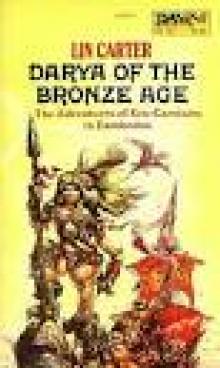 Darya of The Bronze Age
Darya of The Bronze Age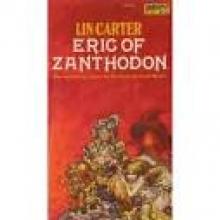 Eric of Zanthodon
Eric of Zanthodon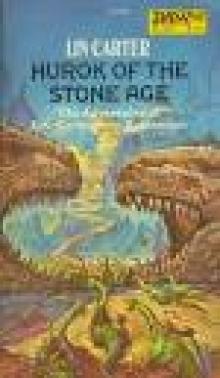 Hurok Of The Stone Age
Hurok Of The Stone Age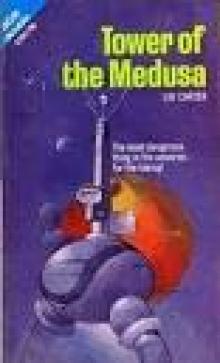 Tower Of The Medusa
Tower Of The Medusa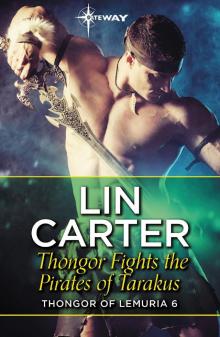 Thongor Fights the Pirates of Tarakus
Thongor Fights the Pirates of Tarakus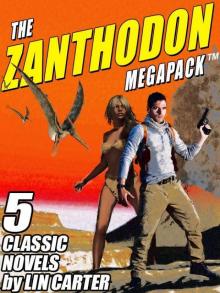 The Zanthodon MEGAPACK ™: The Complete 5-Book Series
The Zanthodon MEGAPACK ™: The Complete 5-Book Series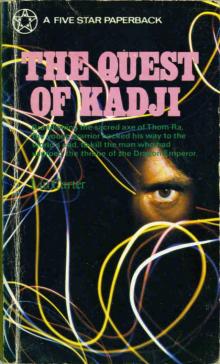 The Quest of Kadji
The Quest of Kadji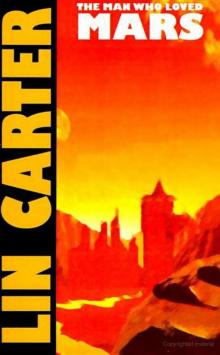 Lin Carter - The Man Who Loved Mars
Lin Carter - The Man Who Loved Mars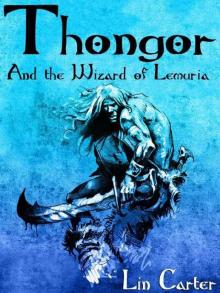 Thongor and the Wizard of Lemuria
Thongor and the Wizard of Lemuria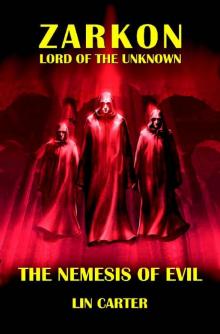 The Nemesis of Evil
The Nemesis of Evil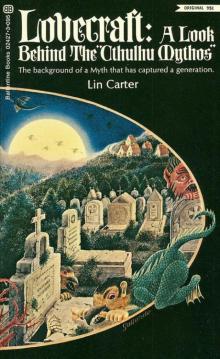 H.P.Lovecraft: A Look Behind Cthulhu Mythos
H.P.Lovecraft: A Look Behind Cthulhu Mythos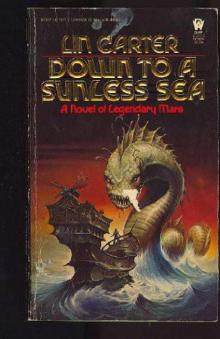 Lin Carter - Down to a Sunless Sea
Lin Carter - Down to a Sunless Sea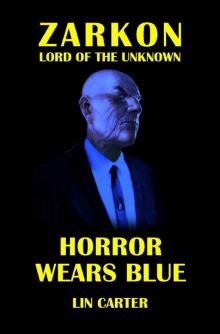 Horror Wears Blue
Horror Wears Blue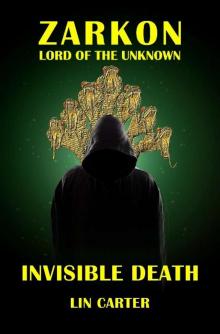 Invisible Death
Invisible Death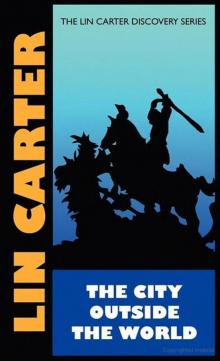 Lin Carter - The City Outside the World
Lin Carter - The City Outside the World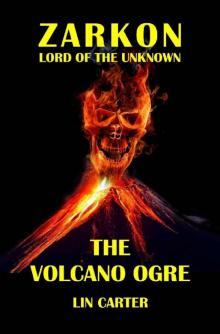 The Volcano Ogre
The Volcano Ogre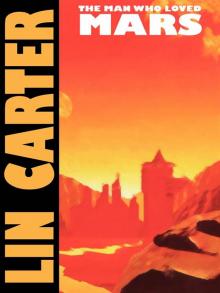 The Man Who Loved Mars
The Man Who Loved Mars